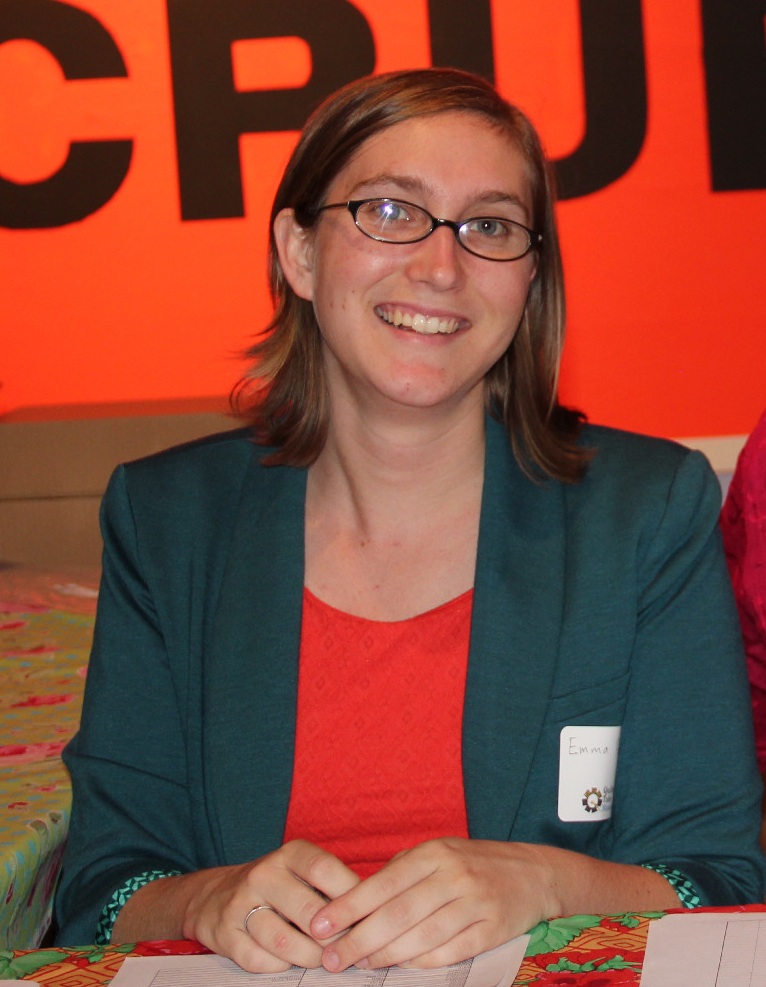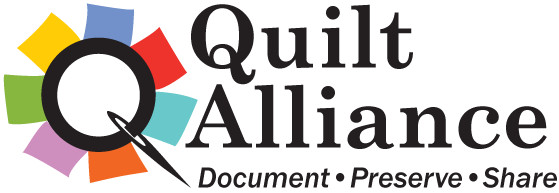Over 200,000 women are incarcerated in the United States. This week’s Q.S.O.S. Spotlight features an interview from the The Ohio Reformatory for Women Quilt QSOS Project. Interviewer Karen Musgrave spoke with Joy Major, an inmate at the women’s prison in Marysville, Ohio. Joy shared a bit about the story of her quilt, “Hands of Time.”:
 “I tried to come up with a title in a quilt that would be in some way part of my journey here. I thought “Hands of Time” because to me it was all about expressing what time here is like. The time before I got here and even time into the future. I thought “Hands of Time” would be able to illustrate that for me. I wrote this little poem about “Hands of Time” and it’s the way the hands turn slowly here and if I could turn the hands back things would be a lot differently. As I started working, I found it so unusual that even though I’ve been here for 12 years, some days the time passes so quickly that I can’t believe it’s been and then other times it seems like one day could be an eternity. I started to pick out material and stuff for my quilt and the most obvious piece that I found was this brick wall [points to quilt.]. To me the brick just represented a stopping point, a confinement of it all. I worked around it and I put the brick on and then I started thinking about the clock. I put the clock on and I used each little scrap of material that we could find because all of the things that
“I tried to come up with a title in a quilt that would be in some way part of my journey here. I thought “Hands of Time” because to me it was all about expressing what time here is like. The time before I got here and even time into the future. I thought “Hands of Time” would be able to illustrate that for me. I wrote this little poem about “Hands of Time” and it’s the way the hands turn slowly here and if I could turn the hands back things would be a lot differently. As I started working, I found it so unusual that even though I’ve been here for 12 years, some days the time passes so quickly that I can’t believe it’s been and then other times it seems like one day could be an eternity. I started to pick out material and stuff for my quilt and the most obvious piece that I found was this brick wall [points to quilt.]. To me the brick just represented a stopping point, a confinement of it all. I worked around it and I put the brick on and then I started thinking about the clock. I put the clock on and I used each little scrap of material that we could find because all of the things that  we had here was donated in some kind of way. So I collected all of the beige or white pieces and I tried to make it as varied as possible because I found that the people here are just that. Everybody is just so individual. I began stitching these pieces together and I didn’t know how to quilt. I had made a couple of quilting projects before that. I didn’t have any lessons in quilting [laughs.]. That is probably obvious, but I just decided to start sewing it together how I thought it would go together. Then I put the little ticks on here, the little time markers to show how time passes here. Then I found these little black and white pieces and when I was first convicted this is what my prison uniform looked like. It was seriously like the old time prison uniforms on television. I put that one on next and I kept stitching and stitching because there is such an enormous amount of time here that I had more time than I had materials. I wanted to use the materials wisely and use the thread wisely and plus it felt real mediating to me too, just keep sewing and sewing…
we had here was donated in some kind of way. So I collected all of the beige or white pieces and I tried to make it as varied as possible because I found that the people here are just that. Everybody is just so individual. I began stitching these pieces together and I didn’t know how to quilt. I had made a couple of quilting projects before that. I didn’t have any lessons in quilting [laughs.]. That is probably obvious, but I just decided to start sewing it together how I thought it would go together. Then I put the little ticks on here, the little time markers to show how time passes here. Then I found these little black and white pieces and when I was first convicted this is what my prison uniform looked like. It was seriously like the old time prison uniforms on television. I put that one on next and I kept stitching and stitching because there is such an enormous amount of time here that I had more time than I had materials. I wanted to use the materials wisely and use the thread wisely and plus it felt real mediating to me too, just keep sewing and sewing…
 This particular feather stitch was something that I noticed when I was a little girl. My grandmother had a quilt with all of these different stitches on them and I wanted to learn how to make them, but at the time I wasn’t able to sit down and apply myself to it. I found them in a quilt book again and as soon as I saw them I thought some way I have to incorporate those into my project. There was a lady here, she is on here I’m sure. Her name is Ms. Betty Toole. She was in the middle of working on the quilt and she passed. She was someone that encouraged me to sew and learn how to sew. She was, I think, in her eighties so it was kind of nice to have her here. Kind of as my own little–we called them prison mothers, and she taught me how to do this feather stitch. This one I thought looked like a measuring stick. I don’t know what the name of all the stitches.
This particular feather stitch was something that I noticed when I was a little girl. My grandmother had a quilt with all of these different stitches on them and I wanted to learn how to make them, but at the time I wasn’t able to sit down and apply myself to it. I found them in a quilt book again and as soon as I saw them I thought some way I have to incorporate those into my project. There was a lady here, she is on here I’m sure. Her name is Ms. Betty Toole. She was in the middle of working on the quilt and she passed. She was someone that encouraged me to sew and learn how to sew. She was, I think, in her eighties so it was kind of nice to have her here. Kind of as my own little–we called them prison mothers, and she taught me how to do this feather stitch. This one I thought looked like a measuring stick. I don’t know what the name of all the stitches.
Karen Musgrave: It is a buttonhole stitch.
Joy Major: Button hole stitch, so I put that on because I thought it looked like a measuring stick and just the X’s I thought we could change part of our past if we could just X some of the stuff out. The fact of the matter is you can’t, so you just have to live with whatever decisions you made and the consequences that came along with them.”
You can read more about Joy’s quilt and what quilting meant to her during her incarceration in her interview here. Click on Interviewee and search for Joy Major to view the full interview.
You can read more quilt stories on the Quilters’ S.O.S.- Save Our Stories page on the Quilt Alliance website.

Posted by Emma Parker
Project Manager, Quilters’ S.O.S.- Save Our Stories
qsos@quiltalliance.org

Very touching. Thanks so much for sharing.
So glad I read the entire interview. This was amazing. She is as eloquent as anyone I’ve ever heard in speaking about her quilting. Thank you thank you thank you.
Thanks so much for reading, Melanie! Joy’s interview and her words about quilting and what it meant to her while serving her sentence are truly compelling. There are 6 more interviews from the Ohio Reformatory for women on the site–you can check them out here: http://www.allianceforamericanquilts.org/qsos/record.php?by=project&key=The%20Ohio%20Reformatory%20for%20Women%20Quilt%20QSOS if you’re interested.
Emma Parker
Q.S.O.S. Project Manager
I would like to post about it on my blog. I know the images of the quilts are under copyright. Am I able to use them as long as I give credit?
Thanks for any help (and no I don’t expect you to be a copyright lawyer!) 🙂
Oh, and I should say, I’d also link back to your post to show where I found it in the first place.
Thanks.
Melanie, would love to have you share these stories and quilts on your blog. Just credit them as follows: “[interviewee name] interviewed by [interviewers name] for Quilters’ S.O.S.- Save Our Stories, a project of the Quilt Alliance. copyright [year of interview].” Thanks! – Amy